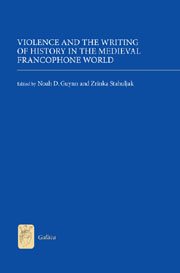Book contents
- Frontmatter
- Contents
- List of Illustrations
- List of Contributors
- Acknowledgments
- Introduction
- 1 Historicity, Violence, and the Medieval Francophone World: Mémoire Hystérisée
- Part I Theorizing Violence
- Part II Institutions and Subversions
- Part III Gender and Sexuality
- Part IV Trauma, Memory, and Healing
- 10 “Guerre ne sert que de tourment”: Remembering War in the Poetic Correspondence of Charles d'Orléans
- 11 Commemorating the Chivalric Hero: Text, Image, Violence, and Memory in the Livre des faits de messire Jacques de Lalaing
- 12 Coming Communities in Medieval Francophone Writing about the Orient
- Index
- Already Published
11 - Commemorating the Chivalric Hero: Text, Image, Violence, and Memory in the Livre des faits de messire Jacques de Lalaing
from Part IV - Trauma, Memory, and Healing
Published online by Cambridge University Press: 05 April 2013
- Frontmatter
- Contents
- List of Illustrations
- List of Contributors
- Acknowledgments
- Introduction
- 1 Historicity, Violence, and the Medieval Francophone World: Mémoire Hystérisée
- Part I Theorizing Violence
- Part II Institutions and Subversions
- Part III Gender and Sexuality
- Part IV Trauma, Memory, and Healing
- 10 “Guerre ne sert que de tourment”: Remembering War in the Poetic Correspondence of Charles d'Orléans
- 11 Commemorating the Chivalric Hero: Text, Image, Violence, and Memory in the Livre des faits de messire Jacques de Lalaing
- 12 Coming Communities in Medieval Francophone Writing about the Orient
- Index
- Already Published
Summary
Just as violence was central to the reality of historical experience in late medieval France and Burgundy, so it was inevitably a key issue in the historical writings of the period whose chief aim was to preserve the memory of knights and their military deeds, to perpetuate an individual's earthly renown, and to present the reader with exemplary models of valorous conduct. These aims are nowhere more apparent than in the chivalric biographies of the period, of which the most famous is that devoted to the Burgundian hero Jacques de Lalaing (1421–53), who was regarded by his countrymen as the very epitome of chivalry. This biography, the Livre des faits de messire Jacques de Lalaing (ca. 1470), composed by an author whose name has not come down to us, draws on a variety of fictional motifs and historical sources for its subject matter: the romance theme of the hero's early chivalric and sentimental education; a fragment of a chronicle of the Ghent War that, until recently, was thought to be by Georges Chastellain but is now unattributed; an epitaph on Lalaing that definitely is by Chastellain; and contemporary heraldic reports of the jousts that the hero fought between 1445 and 1450 during his errances across Europe.
- Type
- Chapter
- Information
- Publisher: Boydell & BrewerPrint publication year: 2013



